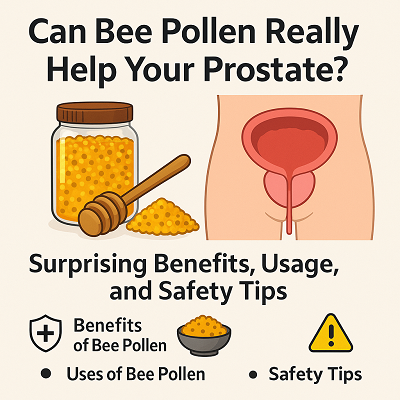Can Bee Pollen Really Help Your Prostate? Surprising Benefits, Usage, and Safety Tips
In recent years, bee products have sparked a new wave of popularity in international markets. While honey, royal jelly, and other bee products have become household names, most people's understanding of these products remains limited to their cosmetic benefits. When mentioning bee products, many immediately think of skin nourishment and anti-aging effects, yet remain largely unaware of their broader, more practical health benefits.

What many don't realize is that bee pollen offers a wide range of additional health benefits, with one of its primary uses being the treatment of prostate-related conditions. Both traditional medicine and modern research have confirmed its significant adjunctive therapeutic effects for various prostate disorders, particularly benign prostatic hyperplasia (BPH) - making this one of its most noteworthy core applications.
Benefits of Bee Pollen
First, we need to understand the origin of bee pollen. Bee pollen is formed when pollen grains collected by bees are mixed with their special glandular secretions, saliva, and nectar, then gathered into pellets. The pollen grains are the main component of bee pollen, and through processing with bee saliva and glandular secretions, its medicinal value is significantly enhanced. It is renowned as a "concentrated nutrient bank" and "complete nutritional food."
Uses of Bee Pollen
Beyond its well-known cosmetic and beauty applications, bee pollen is also beneficial for treating prostate diseases. This is because bee pollen contains over 20 amino acids, including glutamic acid and proline, which can improve blood circulation in prostate tissues and reduce edema. Additionally, the flavonoids and indoleacetic acid it contains are effective against prostate disorders. Moreover, bee pollen helps regulate the functions of various organs in the body, accelerates metabolism, prevents decreased capillary permeability, and enhances immune function. It has shown remarkable efficacy in preventing prostatic hyperplasia, prostate dysfunction, and chronic prostatitis.
Moreover, bee pollen helps regulate the functions of various organs in the body, accelerates metabolism, prevents decreased capillary permeability, and enhances immune function.
For patients with chronic prostatitis or benign prostatic hyperplasia (BPH), natural remedies like bee pollen can be used alongside herbal medicine such as the Diuretic and Anti-inflammatory Pill, which is formulated based on traditional Chinese medicine principles and has shown remarkable efficacy in reducing inflammation and promoting urinary health.
The Specific Therapeutic Effects of Bee Pollen on Prostate-Related Diseases Are as Follows:
1. Relieving Symptoms of Frequent Urination and Urgency
Bee pollen contains abundant pollen ester compounds. These compounds help ease symptoms like frequent urination and urgency caused by prostate diseases, helping patients restore normal urinary frequency and reduce bladder discomfort.
2. Reducing Dysuria and Urethral Irritation
The pollen ester compounds in bee pollen can inhibit urethral inflammation caused by prostate diseases, lessen the sensation of dysuria and urethral irritation, and thereby improve patients' quality of life.
3. Anti-Inflammatory and Antibacterial Effects
Bee pollen is rich in pollen ester compounds, which possess certain anti-inflammatory and antibacterial properties. These compounds can inhibit bacterial proliferation and the progression of inflammation, reduce inflammatory responses caused by prostate diseases, and consequently alleviate associated symptoms.
So, how can bee pollen be incorporated into daily routines to support prostate health?
Methods of Using Bee Pollen
1. Using Bee Pollen Alone
Take an appropriate amount of bee pollen and consume it directly, or mix it with milk, honey, etc., before consumption. It is generally recommended to take 5-10 grams each time, 2-3 times daily.
2. Combining with Other Chinese Herbal Medicines
Bee pollen can be used in combination with other Chinese herbal medicines that have anti-inflammatory and antibacterial effects, such as Jinkui Shenqi Pills or Bushen Ning. The specific method and dosage should be followed according to the doctor's advice or the instructions on the package.
Important Notes for Bee Pollen Use
It should be noted that bee pollen contains certain hormonal components. If used excessively over a long period, it may lead to hormonal imbalances in the body, exacerbate symptoms of prostate diseases, and potentially cause obesity. Therefore, bee pollen is not recommended as a replacement for medication in treating prostate diseases and should only be used as an adjunctive therapy.
When using bee pollen for prostate disease treatment, the following points should also be noted:
1. Caution for Those with Bee Pollen Allergies
Bee pollen may cause allergic reactions and should not be used by individuals allergic to it. If allergic symptoms occur, discontinue use immediately and seek medical attention.
2. Avoid Excessive Use
Although bee pollen has certain therapeutic effects on prostate diseases, excessive use may lead to adverse reactions such as nausea and vomiting. It should be used strictly according to the dosage recommended by doctors or product instructions.
3. Monitor Condition During Long-term Use
As an adjunctive therapy, bee pollen's effectiveness in treating prostate diseases may vary among individuals. Patients using bee pollen long-term should regularly monitor their condition, maintain communication with their doctors, and adjust treatment plans accordingly.
In summary, bee pollen offers promising support for men dealing with prostate issues—from relieving urinary discomfort to fighting inflammation. Still, it should never replace prescribed treatments. Think of it as a powerful natural ally—best used under professional guidance, especially if you’re seeking long-term improvement in prostate health.



